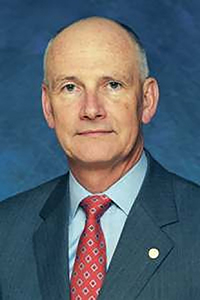
Leadership, professional development, mentoring and strategic visioning have been primary and consistent themes during Robert O’Neill’s stellar career in public service.

He began work as a management intern and rose to leadership positions on the local, national, and international levels. The seeds he planted along the way continue to benefit residents, the local government profession, and city and county leaders.
Early in his career, while city manager in Hampton, Virginia, Bob was a leading proponent of the new public management theory of administration. He created a high-performance organization in Hampton that improved efficiency and economy, fostered organizational effectiveness, and promoted government accountability and transparency. One example of his innovative practices as city manager was a partnership between the city of Hampton and a residential neighborhood. This partnership, negotiated by Bob with residents, created a neighborhood center where the city maintained an historic African American school building and community volunteers provided programming. This initiative, begun in the mid-1980s, continues to this day. It is an early example of what is now known as the “coproduction of public work.”
When Bob left Hampton for the position of county executive in Fairfax County, Virginia, it was clear that he was the ideal person for this large, complex, demanding organization. There, even at that level and scale of government, with intense politics and media scrutiny, Bob continued to stress high performance, innovation, and the development of the staff’s collective and individual capacities. During his tenure in Virginia, Bob was instrumental in shaping the Virginia Local Government Management Association into one of the most effective state associations in the United States.
After his tenure in Fairfax County, Bob took on a national leadership role as the president of the National Academy of Public Administration. He was instrumental in turning the attention of the association toward local government, enabling them to significantly expand recognition and membership to local government staff and public policy scholars.
As ICMA executive director for over a decade, Bob created the Leadership Advisory Board. He recognized that ICMA, whose mission is to create the best leaders, didn’t have a committee focused on leadership. The first task was to draft a definition of the term leadership as it applies to local govern-ment management, and then develop an array of leadership programs and professional development training. Realizing the importance of building a pipeline, and knowing from his own experience the value of mentorship, Bob established the highly successful ICMA Fellows program, ensuring top public administration students received a firm foundation in local government excellence as they began their careers. In addition, he established ICMA Student Chapters at MPA programs across the country to promote the profession and provide guidance to students from local government managers. His development of leadership programs such as the Emerging Leaders Development Program and Leadership ICMA provided training and valuable contacts to young professionals.
One of Bob’s lasting contributions has been his thought leadership. He has spoken and written extensively on behalf of professionalism, local government leadership, and management. He has always been willing to engage with members of the profession. Bob has willingly shared his knowledge and wisdom with others at the Senior Executive Institute (SEI) at the University of Virginia, where he served as faculty. SEI’s leadership develop-ment and training programs, where many ICMA members are graduates, have benefited from Bob’s teaching.
Bob has also served on the board of directors for ICMA-RC (now MissionSquare Retirement) and chaired the ICMA-RC/MissionSquare Vantagepoint Board.
He is now the executive in residence and fellow for the Joseph P Riley Jr. Center for Livable Communities at the College of Charleston, as well as the first Harrell-Hutchinson visiting urban management professional at Arizona State University. These connections are an expression of his continued effort to connect theory to practice with city and county management.
Bob has been a friend and mentor to many who attribute their success to his influence, counsel, and guidance. An innovator and thought leader, Bob advocated a vision of local government leadership and management beyond its inward focus on government operations. He inspired new generations of city/county managers to work in more democratic and collaborative ways with nongovernmental organizations, including business leaders and the public, to promote democracy and add value to community life. His courageous—and at times, controversial—positions have strengthened the profession, ensuring relevance and responsiveness during changing times and conditions.

